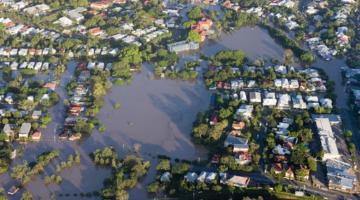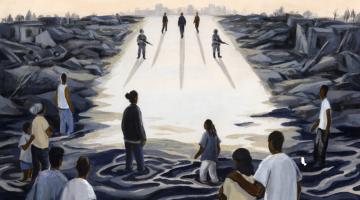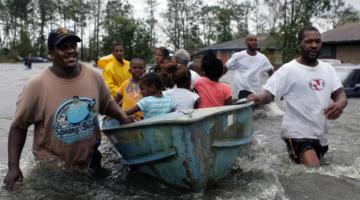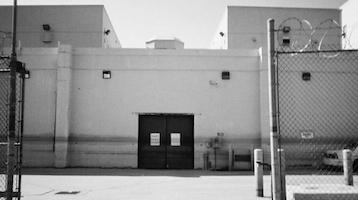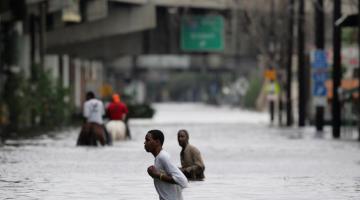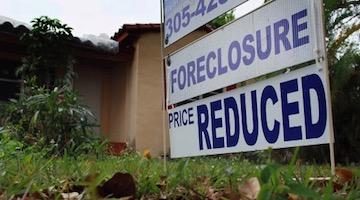Evacuees leave New Orleans after Hurricane Katrina. (Photo: Reuters/Jason Reed)
The anniversary of Hurricane Katrina and a new song are reminders that a strong hatred of the poor continues in the U.S.
Where were you on August 29, 2005 when Hurricane Katrina made landfall in New Orleans, breached 53 different levees, and flooded 80 percent of that city?
Rebecca Solnit wrote a five-year retrospective on Katrina in 2010 called Reconstructing the Story of the Storm: Hurricane Katrina at Five, in which she says: In August 2005, 90,000 square miles of the Gulf Coast were devastated; more than 1,800 people died; 182,000 homes were severely damaged in New Orleans alone, where 80 percent of the city was flooded. Hundreds of thousands went into an exile from which some will never return. A great and justified bitterness arose in African-Americans who were demonized by the media and the government and who felt that they had not been treated as citizens or even as fellow human beings. An African-American woman at an antiwar rally in the nation’s capital a month later carried a sign saying, “No Iraqis left me on a roof to die.” [. . .]
Do not be confused, Hurricane Katrina was absolutely a poor people’s disaster and a significantly Black poor people’s disaster. The Conversation pointed out ten years after the hurricane, “While Gulf Coast residents from all walks of life came to Austin [Texas] in the aftermath of the storm, those who occupied the poorest, and most heavily African-American, wards in New Orleans arrived with the fewest resources. Evacuees from these areas, which suffered the worst flooding and storm damage, often arrived with very little. Many lacked basic identification, a change of clothing, or necessary prescription drugs. They were often separated from family members.”
Why were the relocated evacuees from Katrina in such desperate straights after the storm? Because they were precariously poor in New Orleans before the storm. In 2004, the US Census reflected that New Orleans was 67.3% Black, and the 2000 Census recorded that 27.9 percent of residents lived below the poverty line, 11.7 percent were age 65 or older, only 74.7 percent were high school graduates and 27.3 percent of households did not have cars. Furthermore, a larger than average percentage of residents had disabilities: 10.3 percent of 5-20 year olds, 23.6 percent of 21-64 year olds, and 50.1 percent of those age 65 and older were identified as having disabilities.
So those 500,000 or so New Orleans residents - mostly Black, poor, or disabled - didn’t “choose to stay” to wait out the hurricane as they were often accused of doing; rather many of them literally could not afford to leave. They had nowhere else to go, they had no transportation to get anywhere else if they did, they had no money to pay for transportation or lodging somewhere else, or they were physically unable to manage an evacuation under their own power or with their own limited or non-existent resources. It only made matters worse that New Orleans did not provide sufficient means of evacuation for its poorest and most vulnerable residents, so those people headed for the Superdome and the Morial Convention Center if they could, where a city’s disregard for its poor and disabled played out appallingly on national television for days as the flood waters began to recede.
But as quickly as federal, non-governmental, and charity organizations mobilized across the country to receive hundreds of thousands of Katrina survivors, that welcome mat and the help for those evacuees in the cities that received them was often poorly managed, insufficient, and short-lived.
The Conversation also points out that in Austin, Texas the emergency services programs and facilities erected to receive the evacuees were not designed to provide extended financial support beyond a few months for the mostly poor and Black victims. The medical care, food, shelter, clothing and other support that was provided only lasted a few months, as the emergency shelters closed first leaving few emergency housing options for people who not only had no money but very often had no identification as vital paperwork was destroyed or left behind in the storm. This created an ongoing disaster for those people who were now expected to find work just a few short months after losing everything but were pushed off of emergency services leaving them with no bridge. Unlike middle-class and wealthy evacuees who could grab cash, important documents, and necessities when they left and could stay with friends or were able to afford alternative housing until it was safe to return to New Orleans, many of the Katrina evacuees who were bused or flown to cities like Austin, Texas were already poor before Katrina, were rendered destitute because of Katrina, and were no farther from that destitution now that the nation’s goodwill toward them was running out.
What people who began lamenting the laziness or leechiness of the Katrina evacuees on their social services networks didn’t care to know was that the adult victims of Katrina were facing a particularly dire set of circumstances, as reported in a book that contains an analysis of the efficacy of the services provided to Katrina evacuees in Austin called, “Community Lost The State, Civil Society, and Displaced Survivors of Hurricane Katrina”:
- They were earning an average income of $629/month, with a majority of the respondents – 56% – falling between 0% and 50% of the national poverty line.
- Sixty percent were unemployed and looking for work, often unsuccessfully.
- Many households had received Federal Emergency Management Agency (FEMA) assistance, but the amounts were under $5,000 per household, and were quickly spent on rent, food and utilities as households were rapidly moved out of temporary shelters.
- In spite of their extreme poverty, fewer than half of the evacuees had received food stamps; an even smaller proportion were receiving them at the time they were interviewed.
- Evacuees experienced more limited health care coverage than before their evacuation.
- More than half of the evacuees reported problems with ongoing physical health conditions; more than 40% continued to experience mental health problems.
The study summarizes that “While these organizations [FEMA, various government agencies, and NGOs] came together to assist with immediate emergency needs, even collectively they could not deal with survivors' long-term needs for employment, affordable housing, and personal records necessary to rebuild lives. Community Lost provides empirical evidence that civil society organizations cannot substitute for an efficient and benevolent state, which is necessary for society to function.” Poor people in New Orleans were living precarious lives before Katrina, and it was only made worse for many if not most afterward.
We see what the neoliberals and disaster capitalist vultures did while the poor residents of New Orleans were stranded in strange cities across the country with dwindling assistance, little to no family or social/community ties, and little to no ability to eke out a living where they were evacuated to, let alone return to New Orleans; they took the opportunity to demolish public housing in New Orleans even if it largely survived the hurricane, replaced public schools with charters, and made it both economically impossible for the poor to come back to their communities because they could no longer afford to live there, and physically impossible to do so because many of those communities were simply gone.
Even the grants that were supposed to be awarded through a special state-run program Road Home to help everyone in New Orleans return and rebuild their homes were heavily biased against poor, mostly Black homeowners, and for white, more affluent homeowners. The disparity in grant funding provided to poor homeowners compared to the wealthy was so unequal that many of the families who lived in the mostly Black and lower-income Seventh Ward for generations could not return because they were not given sufficient grant money to repair their homes. In the two decades after 2000, the number of children in the Seventh Ward dropped by more than a third, according to the Data Center, a community research nonprofit, and the Black population in the Seventh Ward decreased by about 19%.
Has treatment of poor people gotten better than the treatment they received before, during, and after Hurricane Katrina? We know the answer to that question, or at least we should if we pay attention to what seems like a completely unrelated cultural phenomenon going on right now.
There are folks allegedly on the left who are celebrating a country song that on the one hand rightfully derides rich men in Washington for ripping working-class people off but in a line or two later delves into stereotypical right-wing shaming of the poor for being fat and on welfare. In his much-celebrated song Rich Men North Of Richmond, Oliver Anthony sings of working-class woes about being worked to the bone from too much overtime and too little pay, too many taxes, too high inflation, and railing against the Washington elites - the Rich Men North Of Richmond - who are responsible for it. Well, most of it, because as much as Anthony drawls angrily about the politicians sucking the working man dry, he inexplicably pivots to bashing the poor in the same song, bemoaning the fact that the “the obese milking welfare,” further declaring that, “Well, God, if you’re 5-foot-3 and you’re 300 pounds/taxes ought not to pay for your bags of fudge rounds.”
Oliver is described in a New York Times article about the meteoric rise of the song’s popularity as a high-school dropout who has struggled with depression and alcohol abuse who had recently found religion and a passion for calling out the “atrocities” of human trafficking and child abuse, which he said were “becoming normalized.” Where is human trafficking and child abuse normalized? In the consciousness of right-wing conspiracy theorists who still believe that a child sex trafficking ring was being run by Hillary Clinton in the basement of a DC pizza parlor, and who have only been given validation of their beliefs by the lack of accountability of any of the people connected to Jeffrey Epstein and his crimes.
Oliver also said, “Just like those once wandering in the desert, we have lost our way from God and have let false idols distract us and divide us.” If this sounds like conservative or even Evangelical talk to you, it’s because it is, and when you realize that Anthony is parroting right-wing talking points about the poor in his song, you soon realize that “Rich Men North Of Richmond” is nothing more than a right-wing populist anthem, one that oddly is being celebrated by some on the so-called Left.
The conservative crusade against welfare recipients using welfare or SNAP benefits to buy soda, ice cream, steak, seafood, or anything off of a hot bar is all over those lyrics about fat people living off welfare and tax dollars paying for poor people’s chocolate snack cakes. And it is all tied to conservatives’ decades-long fight to destroy the program that actually supports mostly working people unless they are disabled.
But in his defense, Anthony says “I do understand there may be some people who misunderstood my words in Rich Men North of Richmond. But I’ve got to be clear that my message … references the inefficiencies of the government because of the politicians within it that are engulfed in bribes and extortion. The words say that there’s, ‘People on the street with nothing to eat and the obese milking welfare.’ That references a news article I read earlier this summer, that adolescent kids in Richmond [Virginia] are missing meals … because their parents can’t afford to feed them and they’re not in school.” But none of that is in the lyrics. He goes on to say, “And meanwhile, I think like 30% or 40% of the food bought with welfare EBT money is … like, snack food and soda. I think 10% spent on soda. And I want to say like 20% or 30% spent on junk food. And that’s not the fault of those people. Welfare only makes up a small percentage of our budget. You know, we can fuel a proxy war in a foreign land” – seemingly a reference to aid to Ukraine – “but we can’t take care of our own. That’s all the song’s trying to say. It’s just saying that the government takes people who are needy and dependent and makes them needy and dependent.”
It all sounds good, but when you examine even his defense, it’s shaky poor-shaming bad class analysis undergirded with right-wing talking points.
A New York Times article from 2017 cites a United States Department of Agriculture (USDA) report that showed that the number one purchase by SNAP households were soft drinks, which accounted for 5% of the dollars they spent on food, while sweetened drinks which included soft drinks, fruit juices, energy drinks and sweetened teas, accounted for almost 10% of food dollars spent. This statistic and a more recent one from a 2016 USDA study which shows that 22.6% of SNAP households' grocery bill is spent on less healthy foods like soda, candy, and salty snacks have been used by conservatives to try to pass legislation to limit what foods SNAP recipients can buy, basically eliminating the purchase of junk food. But the soda and junk food industry is not propped up by SNAP recipients’ purchases alone. These studies also show that SNAP beneficiaries’ food choices are similar to everyone else’s. People who are not recipients of SNAP benefits also purchase lots and lots of junk food. Do those people deserve their junk food because other people’s taxes aren’t paying for them? Should poor people just accept that they don’t deserve to enjoy a sugary salty fizzy snack because those snacks are being paid for with taxes? That is literally the argument Anthony makes in his song, the same argument conservatives make when they’re trying to keep poor people from buying soda with SNAP benefits, and that has nothing to do with neediness, dependencies or inefficiencies in the system.
If, as Anthony says, this isn’t the fault of those people, then why make a lyric demonizing those people for their victimization? What was the point of singing that a fat man had no right to have taxes pay for snack cakes other than to perpetuate the conservative stereotype of the fat, lazy welfare cheat? He can claim that the song is trying to make a point about funding a proxy war in a foreign land but can’t take care of those in this country, but the fact is he did not say any of that. Instead, he shamed fat poor people, and there really is absolutely no excuse for that lack of clarity, artistic expression, and imagination. Especially since “We’ve got money for war, but can’t feed the poor” is an easy layup of a catchy lyric that already exists and accurately reflects what he claims he was trying to say but somehow came up with taxes shouldn’t pay for fat poor people’s fudge rounds instead.
But what is more inexcusable to me is the acceptance of this song and the clear class antagonism toward the poor and the hateful stereotypes of them among some on the Left. How is that even happening after this administration refused to extend or make permanent COVID emergency programs that helped the poor during the pandemic like the Child Tax Credits or the extension of SNAP benefits or Medicare extension? Because Anthony is calling out the so-called “Rich Men North of Richmond,” is that enough for some people to ignore his hamfisted and hateful depiction of the poor, who by the way are largely disaffected and disrespected workers just like he is, they just happen to need SNAP to survive?
Further, those same Latte Leftists as I have taken to calling them have also ignored that it was the right-wing punditry class, Matt Walsh, Joe Rogan, Joe Posobiec, Jason Whitlock, et al, who propelled this immature and messy song to popularity, chiming right along with them that this is the new people’s protest song, the new stick-it-to-the-man anthem from an awakened working class, except there has always been a working class that has been calling for sticking it to the man AND that has an accurate class analysis about who our enemies really are, and it is decidedly not fat people or people on welfare. Punching down will not win us the just society we all deserve.
I know it might seem like these two issues I’ve discussed - Hurricane Katrina and the song Rich Men North Of Richmond - have nothing to do with each other, but I recalled where I was on this day in 2005 when those 53 levees failed and the nation failed all those poor New Orleans residents. I wondered where they are now, and I wondered if they are faring better today, 18 years later. Then I thought about this song and the response to it not from the Right, which is typical, but from some on the Left, and I know that no, the poor haven’t been and aren’t being treated better in this country since Katrina in 2005. They’re still the favorite scapegoats for malicious and opportunistic capitalist vultures and the politicians in both parties that they own, and for working-class people with a very immature and dangerously incorrect class analysis.
Jacqueline Luqman is a radical activist based in Washington, D.C.; as well as co-founder of Luqman Nation, an independent Black media outlet that can be found on YouTube (here and here and on Facebook; and co-host of Radio Sputnik’s “By Any Means Necessary” .

